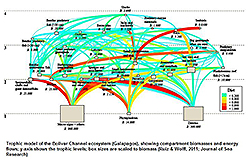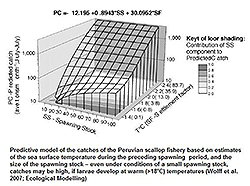Dieser Text ist zur Zeit nur auf Englisch verfügbar
Models used for resource management are rooted in ecological theories on the functioning of populations and ecosystems, which have undergone paradigmatic changes over the past decades. The concept of equilibrium states of populations and ecosystems has been confronted with that of ever-changing states of biotic entities, and the role of environmental vs. biological forcing („bottom-up, top-down“) in determining population sizes and harvest potentials of aquatic resources is hotly debated. Depending on the type of resource (long-lived, short-lived; tropical, temperate; fish, invertebrate, etc.), data availability, level and kind of training of fisheries modeler, a diverse set of models are presently being applied for the management of aquatic resources. The ZMT working group resource management concentrates on the following main themes:
Single species stock assessment
Traditional tools and models for single-species stock assessment are being applied to coastal resources of the tropics to derive estimates of current exploitation rates and to provide the basis for a sustainable fishery. In doing so, vital population parameters such as growth and mortality rates are being determined and factors are identified that determine the stock-recruitment relationships and interannual fluctuations in stock sizes.
Ecosystem-based resource modeling
In recent years the ecosystem-based modeling approach (EBMA) has gained much ground worldwide, as it allows to model the resource in its ecosystem context and to explore the effect of resource use and/or protection via marine protected areas (MPAs) on the socio-ecosystem. At the same time, an increasing number of scientists have tried to also incorporate climate variability into the fisheries models allowing for improved harvest predictions.
The Resource Management group at the ZMT follows the EBMA approach and also looks into the role of climate variability in regulating resource productivities. Through computer simulations of resource use and climate impact scenarios, resource management recommendations are being elaborated, which also take into account the socio-economic context of the fishery.
Social-ecological network analysis
Social-ecological network analysis (SENA) is an emerging field that aims at studying human-nature in social-ecological systems (SES) through a network lens. Theoretically, it provides a basis to advance the modeling of players and their complex interaction from both the social (e.g. institutions, stakeholders) and the ecological (e.g. species, ecological processes) realm as to enhance ecosystem conservation and sustainable resource management. In practice, however, the identification of actors (nodes) and interactions (links) as well as the definition of system boundaries are methodologically challenging and case-specific. In our work, we contribute to ongoing global literature discourses by applying the network approach to particular case studies (small-scale fisheries SSF-SES) to advance conceptual framing and methodological discussions of SENA.
News
The project " Social-Ecological Tipping Points of the Northern Humboldt Current Upwelling System, Economic Repercussions and Governance Strategies (Hulboldt-Tipping)" in which ZMT is a project partner, just had its first kickoff meeting in Kiel on March 2019 (link)
The ZMT working group Ressource Management just completed the Report of our International Workshop on Ecological Network Analysis (ENA) that was conducted on September 19-21, 2018 with the participation of 33 scientists from 8 countries.
The fisheries assessment program package TropFishR, which was elaborated in the Resource management working group by Tobias Mildenberger, is published to CRAN and is now publicly available. It is also linked to the FishR webpage of Prof Derek Ogle
Capacity development
ISATEC (International Studies in Aquatic Tropical Ecology), International Master of Science program at University Bremen directed by Prof. Dr. M. Wolff (since 1999); ISATEC is part of the DAAD program “Development-Related Postgraduate Courses” and citizen of developing countries may apply for scholarships.
TropFishR courses have been taught in Uni Magdalena (2016) and in Uni del Valle (2016) by Prof. Dr. Matthias Wolff and Ph.D. candidate Tobias Mildenberger, in order to promote this tool to assess fish stocks targeted by small scale fisheries in the tropics.
Further research projects
- Colombia
- Ongoing
- MACOPA: Food webs in mangroves of the Colombian Pacific coast and their role in explaining fisheries productivity and resource use (BMBF)
- MIMAC: Identification, demarcation as protected sites and integrated management of coastal areas of the Colombian Carribean subjected to climate change impacts (GIZ/ BMZ)
- Completed
- HolFishCol: Holistic assessment of data-limited, tropical, small-scale fisheries: the Colombian Pacific case (CEMarin (DAAD, Colciencias)
- Understanding and valuing mangrove ecosystem function and services in the Panama Bight eco-region (Alexander von Humboldt Foundation)
- Hydroacoustic evaluation of the fisheries resources, bathymetry and sea bottom characteristics in shallow waters of “Cayo Serrana, Biosphere Reserve Seaflower“ (Colombian Commission of the Ocean)
Costa Rica
- Completed
- MONICOYA: Modeling two decades of change of the Nicoya Gulf (Costa Rica) ecosystem: implications for future management
- Eastern tropical Pacific and Humboldt Current system Comparative assessment of trophic structure and resource productivity of Eastern Pacific Tropical Ecosystems (ETPE) of the Seascape region (Galapagos, Malpelo, Gorgona, Coiba, Coco) (ZMT, UoT( University of Toronto), NOVA (Nova Southeastern University), NAZCA (Ecuatorian NGO) and CDF)
- COGA: Functional role of carbonate secreting organisms in upwelling and non-upwelling zones of the Galapagos marine ecosystem
Ethiopia
- Completed
- Fishery and population dynamics of the fish stocks in the Rift Valley Lake Koka, Ethiopia (DAAD and Ethiopian Ministry of Fisheries)
Gambia
- Completed
- Impact of climate change on the Tanbi wetland reserve and its ecosystem services (WASCAL, Bonn University, and ZMT)
Indonesia
- Completed
- Changes in trophic flow structure of the Segara Anakan over the past two decades and socio-economic impacts
Ghana
- Ongoing
- FEEDING: Fisheries Assessment and Trophic Modelling of Tono, Botanga and Golinga Reservoirs in Northern Ghana (DAAD)
Kenya
- Ongoing
- FIDEA: Fishing Data East Africa (BMZ)
- Completed
- Assessing the state and impact of the artisanal reef fisheries and their socio-economic implications in Diani Chale (BMBF/ IB)
Peru
- Ongoing
- Humboldt-Tipping: Social-Ecological Tipping Points of the Northern Humboldt Current Upwelling System, Economic Repercussions and Governance Strategies (BMBF)
- Completed
- SASCA: Sustainability analysis of scallop management in Sechura Bay, Peru (BMBF/IB)
- MOSETIP: Modeling socio-ecological tipping points for the Latin-American center of scallop cultivation (BMBF)
Philippines
- Ongoing
- Biological and socio-economic impacts of destructive/illegal fishing operations in the Danajon municipal fishery, North western Bohol, Philippines (Ecosystem Improved for Sustainable Fisheries Project, ECOFISH and KAAD) (pdf)
Zanzibar
- Completed
- SUTAS: Sustainable Use of Tropical Aquatic Systems
- SAW: Graduate School Project with a regional focus on Zanzibar
- Fisheries assessment of the Matemwe (coral reef) and Chwaka (mangrove) ecosystems (SUTAS)






